Every Thursday, while the rest of Bonifacio Global City sleeps, Arnel Santos puts on his protective jumpsuit and thick safety boots, and heads out in the darkness for the drive to Batangas City.
About two hours later, the president and CEO of JG Summit Olefins Corporation (JGSOC) makes it to the gates of the company's petrochemical complex just as the sun rises.
At 6 a.m., Arnel dons a helmet and goggles and his field walk begins, as he does his rounds around the complex, checking in on the team working the overnight shift in the plant that buzzes with activity around the clock.
Today, he climbs up and down flights of stairs with an engineer, looking at equipment, asking her questions.
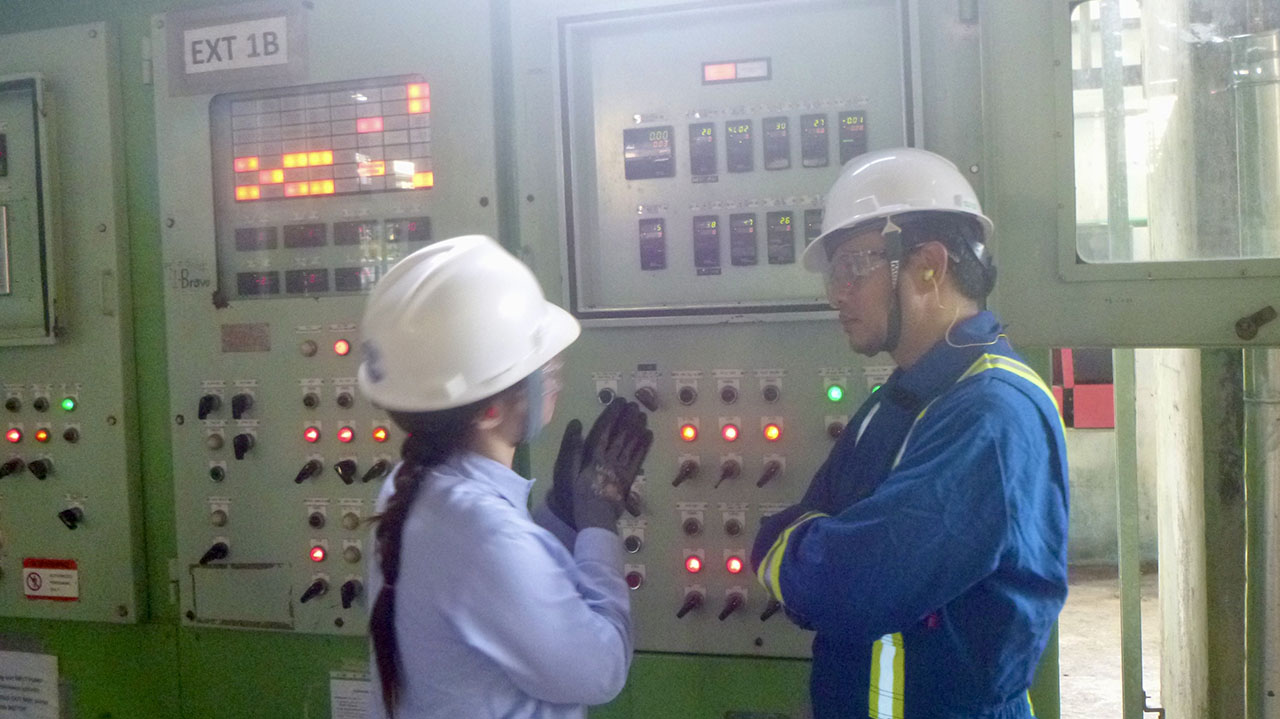
“I want to understand the processes from the perspective of frontliners. She showed me what the challenges were in the last two weeks, and then explained how she solved them. What worked, what failed. She showed me her ownership,” says Arnel. “Sure, she could’ve written it down and I could’ve read her report. But I walked with her for half an hour so I could learn more about her, so she could show me what she does. I always appreciate things better when I head to the frontlines myself.
Arnel checks in at the nerve center, looking at data, crunching numbers. He then heads to another meeting, listening intently to employees in various roles talk about their pain points, taking down notes, giving them advice.
EARLY YEARS
Arnel is back in the Philippines after over 25 years as an expatriate around the globe. He’s spent most of his career at Shell, starting at its facility in Tabangao, Batangas, and then living in the Netherlands, Singapore, Malaysia, and Canada.
“I’ve always been clear about my goals. Very focused. I knew I wanted to go to UP (University of the Philippines) and take chemical engineering. Later, I knew I wanted to work with Shell versus the other refineries because I wanted to go to Holland. I had that singular goal,” he tells me when we meet at the Manila office, where he spends the rest of the week with the non-manufacturing part of the company, including strategy, sales, logistics, and the rest of the back end.
The journey to his UP degree wasn’t an easy one.
Arnel grew up in Tondo, the eldest of three children.
Neither of his parents finished college because “walang pera,” Arnel says. They simply didn’t have the resources to do so. Tatay had been taking electrical engineering at the University of the East, but didn’t have the money to continue. He switched to a vocational course instead, and became an electrician, fixing TVs and radios around the neighborhood.
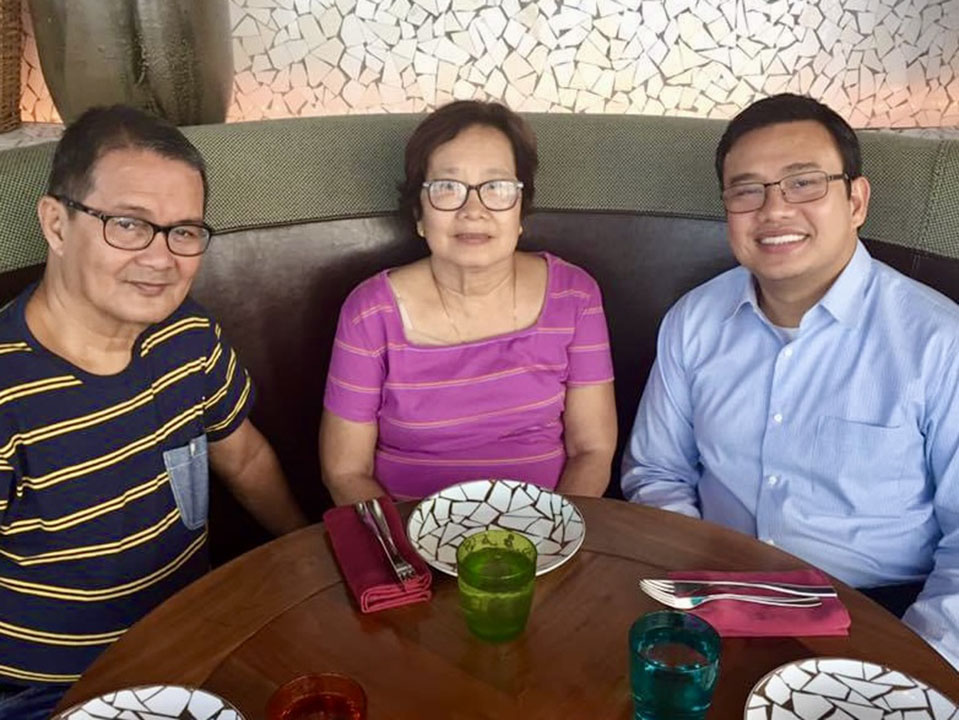
Nanay was “anak ng pulis,” the daughter of a cop. She was one of many children, and had to stop schooling in her second year of Nursing at UP. Even if they didn’t have to pay for her tuition, her parents couldn’t afford to pay for her books.
After they were married, Arnel’s parents put up a small sari-sari store, but their customers kept purchasing on credit, and many never paid up, so the store eventually folded.
“Fortunately, we had generous relatives. They were not wealthy themselves, but were willing to help out,” says Arnel. “My main benefactor was a great aunt who was a widow and had eight kids of her own, but she was willing to share. She helped Tatay make ends meet, and she helped with our education.
“In Tondo you have to be street smart to survive and thrive. Whatever you think is stereotypical, what you see in the movies, that’s all true, in fact. Those tambays in the streets, the hard life,” says Arnel. “That education of growing up in the neighborhood served me well. How to get along with all types of people.”
Arnel went to public school, where he graduated valedictorian, then on to Manila Science High School, where he took a jeep to school when he could afford it, or walked the four kilometers each way otherwise. In high school, Arnel graduated with honors and a gold medal.
He'd always been fascinated by math and science, so Arnel applied for Chemical Engineering at UP, where his education was taken care of by the state. He finished his degree with honors, cum laude, in 1991.
In his last semester, Arnel didn’t wait for a career day opportunity or a visit from a recruitment officer. He went to the Pilipinas Shell office in Makati and told the guard he wanted to meet the HR team. The guard didn’t allow him in without an appointment, but agreed to accept his résumé and pass it along.
A week later, Arnel got a call to come in for a whole day of interviews, and was eventually offered the job that kicked off his lifelong career.
COMPLETE UPHEAVAL
He spent six years at Pilipinas Shell in Tabangao, Batangas, where he learned the ropes, and then he finally achieved his goal of moving to the Netherlands.
“I knew what I wanted, but aside from working hard, it helps to have mentors. People to support you, to give you a break,” he says.
Still, 1997 was a complete upheaval for Arnel. He and his wife, fellow engineer Desiree Guillen, had just been married when they moved overseas for the first time. Soon after, they had their first child.
“It really tested Des and me. We went through things we had never experienced in our relationship,” says Arnel. “It was very cathartic. Fortunately, we survived and became much better people at the end of all that.
“Meanwhile, I was adjusting to a new culture in a big organization. It was a culture shock for me, working with the Dutch who are very direct, candid and opinionated, so different from Filipinos who are non-confrontational. I had to adjust, adapt, make sure I didn’t lose being Filipino,” he says.
In the Netherlands, he was able to establish his credibility as an engineer. Shell rated its employees’ potential, and he was rated as “a very high-potential Asian talent.”
“Those years cemented my career at Shell,” he says. “The system trusted me more. I was put on a different track, given more opportunities. Every two years, I was given a bigger role.”
Between 1997 and 2001, while still in the Netherlands, Arnel completed a design for a new plant in Canada.
LEADING A TEAM
After five years in Europe where he worked mostly on his own, with no direct reports, Arnel moved to Singapore, where he became a team leader, working with operations and leading the plant. That’s where he honed his people skills, working in a largely operational role with a more complex one of people leadership.
“The technical side always came easy. But in Singapore, I focused on learning how to lead people. I also learned more about the commercial side of the business, such as supply and trading. It was a whole new skillset,” says Arnel. “It was a good culture. People were very direct, ambitious, driven, aggressive, even. With the exposure from Holland, I could be more direct too, and could engage in difficult conversations as I led locals and expats. I always inserted myself in conversations to learn more, when there were opportunities to create more value. I immersed myself in learning.”
After another five years, he was sent back to the Netherlands, as a global leader for technology. He led a group of professionals in different locations: the Netherlands, Singapore, Malaysia, India, and Houston.
“We did technology development, deployment, process design, and engineering. It was very technical,” Arnel says. “The bigger challenge was learning how to lead a team of different nationalities, with different cultures, handling various jurisdictions. Even the time zones were different. I had to focus on how to deal with so many different people, interact and work with seasoned professionals, and create a common vision, unified ways of working, norms. It was a people challenge, and it was a fascinating time.”
TRANSFORMATION
To support his continuing progression in the multinational corporation, Shell sent him back to the Philippines, to lead the plant in Tabangao, Batangas, where he had started his career. Full circle.
Business was bad, and he was tasked with transforming the company, since they were considering shutting it down and selling it to a competitor.
I was directly told that if the company were to be sold, I’d be part of that sale. It was jarring since I thought I’d be with Shell forever. So my goal was to make it difficult for Shell to let go of the site. We created that compelling vision to turn it around, and then we all rallied together to create more value, to work with others in creating value.
“My goal was to make it difficult for Shell to let go of the site. We created that compelling vision to turn it around, and then we all rallied together to create more value, to work with others in creating value.
“I worked with retail, as well as business-to-business to generate more revenue. Performance improved and we succeeded in moving the company forward. Shell decided, okay pala ito, let’s invest more in the site. We succeeded with the transformation.”
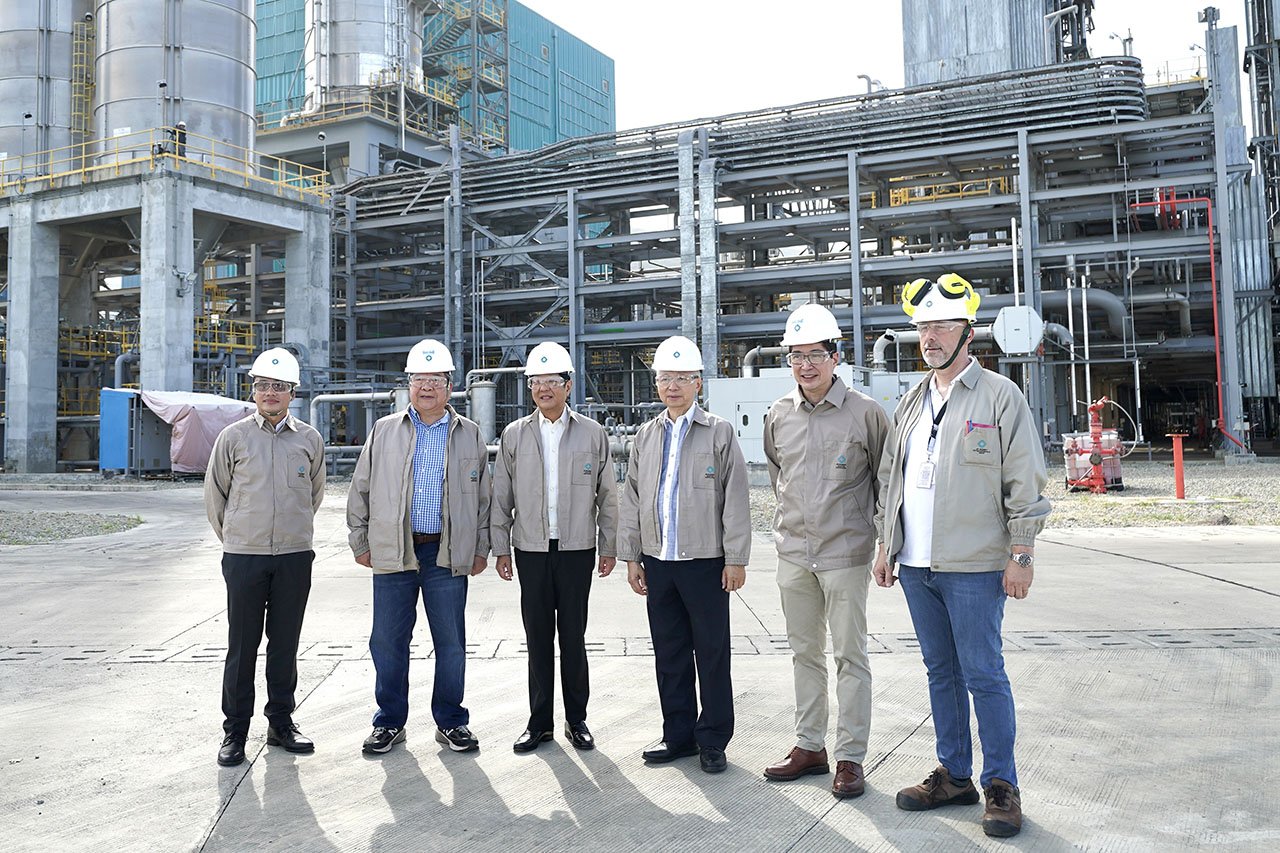
After 18 months back home, Arnel and his family moved to Canada, to lead the same site he had designed when he was based in the Netherlands a decade earlier.
“It was nice to know na ako ang nag-design nito all those years ago. It was a measure of technical excellence, and a big confidence booster seeing it in operation, this time, as the leader of the site,” he says. “A decade later, it was still operating well. It didn’t have any problems.”
It was also the first time for a non-Caucasian expat to lead a site in Canada.
Again, he was immersed in a new culture, and a new business. Through the years, Arnel had been involved with the downstream part of the business, that is, processing oil, refining it for use in chemicals, retail, and others. In Canada, he was part of the upstream component, that is, oil production itself. How to extract crude oil.
A bigger job opportunity opened up in Singapore another 18 months later, but all the moving had taken a toll on his family life. His daughters were tired of being so-called “third culture kids,” those who grew up in multiple cultures and countries. They were tired of the pain of being uprooted from somewhere familiar, losing friends, adjusting again to a new home that they knew may not be permanent again. They wanted to be grounded, to finally be in a place where they could feel they belonged.
And so Arnel went off to Singapore on his own to lead Shell’s Asian business, while his wife and kids stayed on in Canada.
He loved the work, but it was a tough time for him personally, alone and away from his family. Three years later, after 25 years and a storied career at Shell, he moved back to Canada.
LEARNING NEW SKILLS
He joined NOVA Chemicals as chief operating officer for five years. It was a much smaller company, so he covered many more functions he hadn’t done at Shell. He handled two business units, petrochemicals and polyethylene, and was in charge of everything from central engineering to manufacturing, corporate safety, corporate logistics and procurement, research development and innovation, even government relations.
He had direct accountability for the supply chain and commercial elements such as negotiating contracts and developing deals with suppliers.
“Again, it was a learning experience. I led procurement and logistics for the first time in my career. We changed management. Over time, what I learned is that you need to build a team that will complement your own gaps. You don’t have to be the most knowledgeable expert, but you have to know enough. And you have to have the right people supporting you,” he says. “We built a lot of things with my team from the ground up. I poured in my heart and soul in those five years of transformation. I enjoyed them completely.”
You need to build a team that will complement your own gaps. You don’t have to be the most knowledgeable expert, but you have to know enough. And you have to have the right people supporting you.
After a brief stint with a startup that did AI machine learning, something he was fascinated with, he decided he was not cut out for the ups and downs of a startup, where there were existential questions every day.
He then made the move back to refining, joining Suncor, the biggest oil and gas company in Canada.
“It was a dream company,” says Arnel, who was given the position of Senior Vice President for Refining and Logistics. He oversaw 2,800 people involved with terminals, pipelines, and marine facilities across North America. “Again, we needed to do a transformation because it was lagging behind its peers in its share price, and was a case for change. I enjoyed that.”
MOVING BACK HOME
But then, life happened. Back in Manila, Nanay was diagnosed with breast cancer. When the COVID pandemic hit, both Nanay and Tatay caught the virus and were brought to the hospital. Tatay never made it back home.
Their daughters, all grown up, had already moved out, and Arnel and Des were just settling into a new home they had bought a year earlier, when the invitation came to interview for a position back in the Philippines, to lead JG Summit Olefins Corp. (JGSOC) as president and CEO.
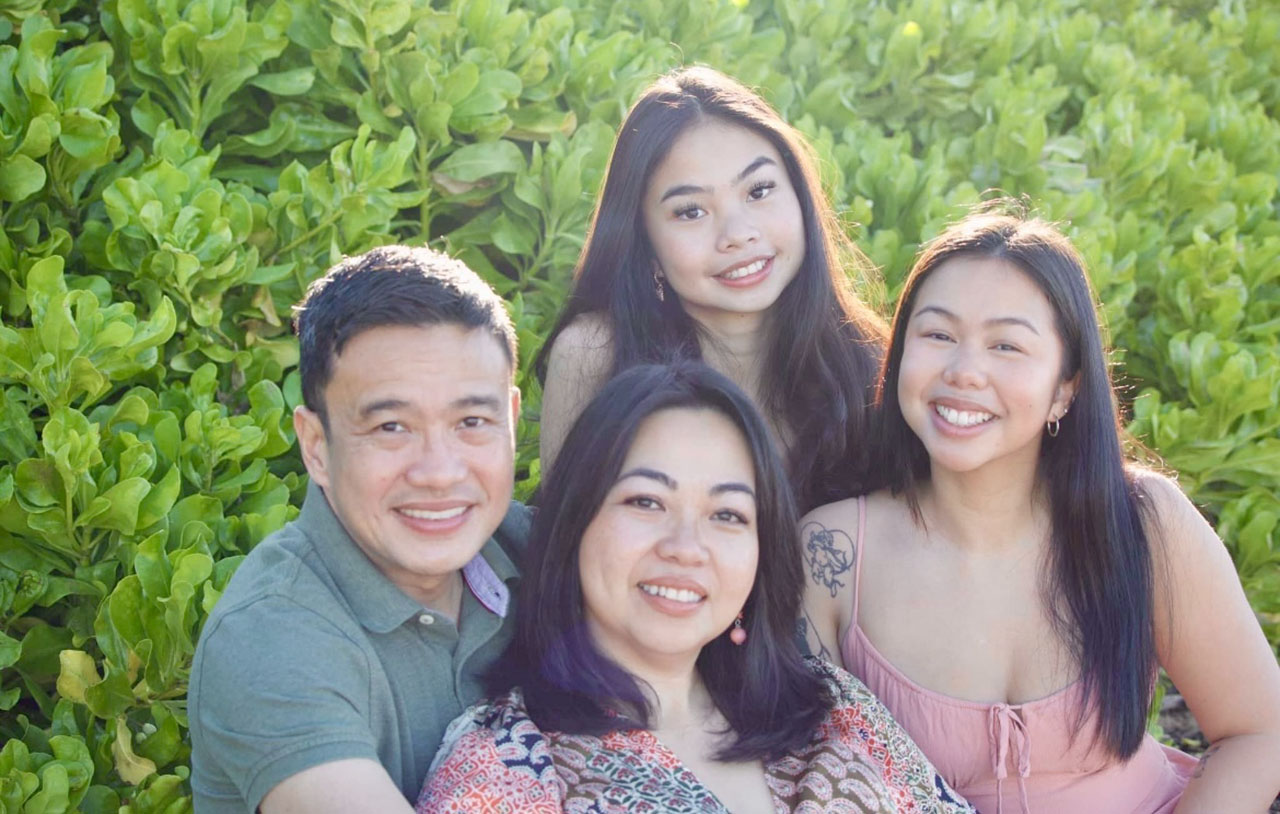
Arnel thought it was a sign and an exciting opportunity, and after a slew of virtual conversations, he was offered the job.
“I’d known of the Gokongwei family, but didn’t know them personally. It felt good talking to Lance. I was very comfortable with his style. He’s smart, supportive, firm, but fair. He keeps me on my toes. I like his passion for this business,” says Arnel, of Lance Gokongwei, JGSOC chairman and JG Summit president and CEO. “Mr. James (JG Summit chairman) also talked to me for a very long time before they made me the offer. I haven’t been disappointed since. The board has given me all-out support. I’ve been away for so long so I’m not known in the local business community, so I’m glad they took a chance on me.
“There were two drivers for this move. The first was my family. Then there was the opportunity to give back to the Philippines, something I’ve always wanted to do, through the petrochemical industry, which I like,” he says. “The total consideration made it compelling. Slam dunk. And now I’m here.”
Des, still furnishing their new Calgary home, was caught unaware, and did not feel she was ready for yet another move. While they had previously discussed retiring back home, it wasn’t on their timeline for at least another three years.
“My wife went through a lot last year to make this move happen. I’m impressed by her resilience and grit,” Arnel says.
The big plus of being back home for Des is being much closer to her parents, both in their 80s, who live in Davao, and to Nanay, who still refuses to leave the home where she and Tatay built their lives in Tondo.
JGSOC AS THE CATALYST FOR MANUFACTURING
“Our mindset now is that we are here for the long haul. I’m confident JGSOC will thrive. I see it as the linchpin of manufacturing in Philippines, vertically integrated, downstream and upstream. It will be the catalyst for manufacturing,” he says.
“I’m motivated to make a difference. As Friedrich Nietzsche said, 'He who has a why to live for can bear almost any how.’ There is that overarching why for me, and that is why I am here.
“Our mission-vision for JGSOC is to excel in science, technology, engineering, and innovation, as we continue to contribute to the wellbeing of the communities around us, as well as those of Filipinos around the country. Those are the driving forces of why we exist, and what will drive us forward. We bring value to our stakeholders and our shareholders.”
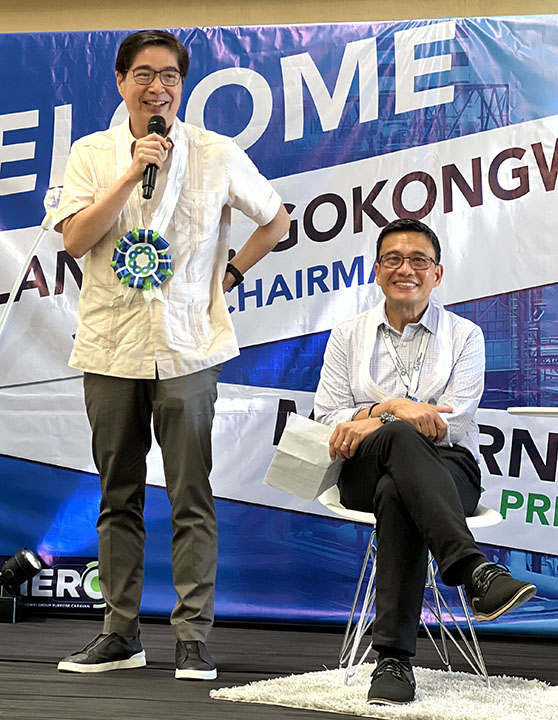
The day I’m with Arnel in Batangas, he shows me an email he sent to 1,200 employees. He asked them what they want JGSOC to be, and to share one personal goal for 2024. About 500 people had already replied at that point, and he acknowledged each one with a short note, picking a point from what they had said, and responding to it, to let them know he had personally read what they had written, that he was aware of their concerns.
From there, he synthesized a narrative for the company of the group’s personal goals, which he was planning to share with the company at the next town hall.
ECOSYSTEM FOR PEOPLE DEVELOPMENT
Arnel says he is methodically creating an ecosystem for people development and leadership development, developing hard skills, and an even more difficult job, developing soft skills.
“I want JGSOC to be a company that is authentically invested in the well-being of its employees, developing people with the right competencies at the right time, leaders with the right capabilities,” he says. “I want to keep and institutionalize knowledge into the system, grow and keep people with knowledge.”
Our mission-vision for JGSOC is excellence in science, technology, engineering and innovation, as we continue to contribute to the wellbeing of the communities around us, as well as those of Filipinos around the country.
Arnel says he wants JGSOC employees to embody the values of the conglomerate.
“Dream big. Own it. Have accountability. What we say is what we do. And be professional in all that. That is the foundation of our culture,” says Arnel. “Part of the transformation is accelerated commercial excellence. How to manufacture in the best way, the most competitive way, offering the market what it needs, so we remain a valued supplier, a partner of first choice actively sought after by customers. And then executing, maturing, improving, growing, nurturing that culture.
“Once we can say we’ve adopted change, it should show in our results. Get things going from here on out. Adapt and be agile,” Arnel says. “We need to create the ability to respond, adapt, respond, learn. Be resilient and thrive in any situation.”
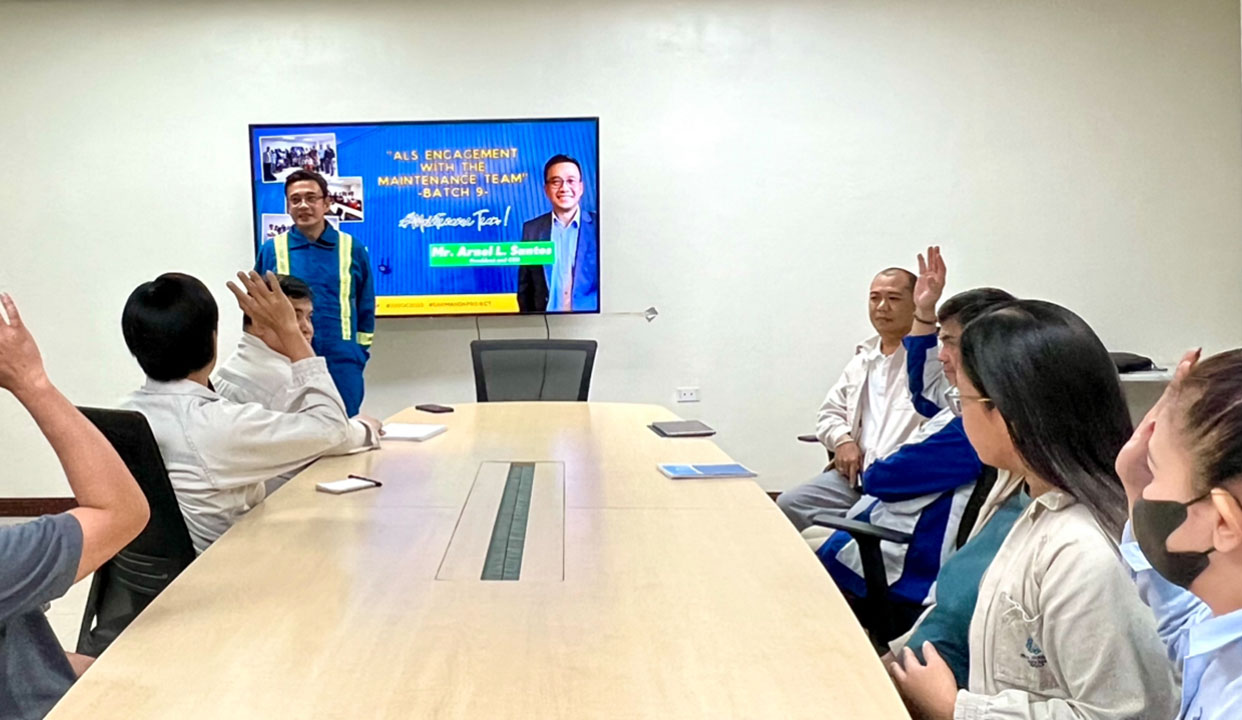
He uses whitewater rafting, a popular pastime in Canada, as a metaphor.
“It’s like we’re all on a kayak paddling together. The environment is unpredictable. At any time point in time, we have to be prepared for strong waves and rocks along the way. We never know what’s coming to hit us, so we have to develop leaders who can adapt quickly to different situations at any moment,” he says. “Sometimes while we’re going downstream, we get stuck in an eddy which sends us back upstream. So, we’re working hard and expending lots of energy, but we’re not moving because we’re going around in circles.
“We need the right people in the kayak, tough ones who can paddle in unison,” he says. “Once they’re in place, paddling in cohesion, navigating the tough waters, I’m confident and optimistic we can get to where we need to go.” -- Yvette P. Fernandez


